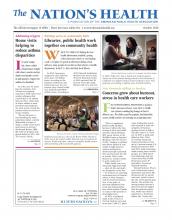Racist violence committed in the past has health implications today, new research finds. According to a study published in July in the Journal of Racial and Ethnic Health Disparities, southern U.S. counties with records of lynchings now have higher mortality rates than those with no such history.
Researchers defined lynching as “an unpunished murder” characterized by mob violence committed by at least three people and lacking community sanctions for the perpetrators. The practice “has been characterized as a means to maintain white supremacy by terrorizing the African-American population, while simultaneously expressing the solidarity of white residents across class and geographic regions,” according to the study. It noted that historic lynchings have been linked to discrimination in housing, schools and the criminal justice system.
“The root cause that drove the lynchings in that period still is in place today…so dealing with the root causes of health disparities is dealing with racism,” study co-author Saundra Glover, PhD, associate director of the South Carolina Rural Health Research Center at the University of South Carolina, told The Nation’s Health.
Researchers analyzed county-level data using data from 12 states from 1877 to 1950 in the Equal Justice Initiative’s lynching database. They determined county-level mortality rates using data from the Centers for Disease Control and Prevention’s Wide-Ranging Online Data for Epidemiologic Research database for 2010 to 2014.
Average county lynching rates ranged from 0.39 in North Carolina to 4.19 in Florida. In comparing counties with the highest and lowest lynching historical categories, researchers found living in the highest-lynching counties was associated with 34.9 additional deaths per 100,000 per year today for white males, 23.7 for white females and 31 for black females. No such association was found among black males.
Counties where lynchings were took place had higher proportions of black residents as well as higher average unemployment and wealth disparities among households. In counties without lynchings, there was a higher proportion of adults lacking health insurance.
Among white populations, living in a county with historic lynchings was associated with higher mortality rates — a finding that suggests racist violence has negative impacts across racial groups, according to researchers.
Lead study author Janice Probst said she and her team predicted that black death rates would be associated with lynchings. They were surprised to find that there were stronger correlations for white mortality rates. However, the explanation could lie in the widespread and lasting harms of racism.
“It may be that people are adversely affecting the social determinants of health for all when they are disenfranchising minority populations,” Probst, director of the South Carolina Rural Health Research Center, told The Nation’s Health.
Probst and Glover said that public health can help address the systemic racism currently impacting communities through improved engagement, including community-based participatory research.
Public health also must look farther back in history to understand influences on current health inequities, said Glover, who serves as director of the Institute for Partnerships to Eliminate Health Disparities at the University of South Carolina.
Communities are already aware of the disparities affecting them, but “what we don’t talk about is the issues that drove those disparities,” Glover said.
For more information, visit https://link.springer.com/article/10.1007/s40615-018-0509-7.
- Copyright The Nation’s Health, American Public Health Association









